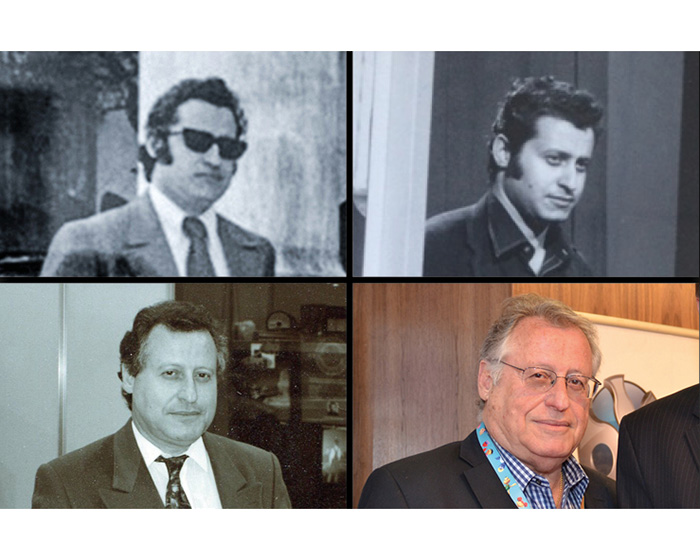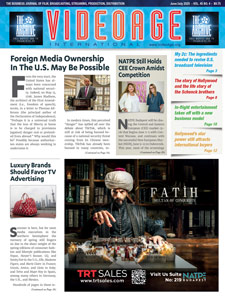U.S. film and TV veteran Irving (Irv) Holender began his career in the entertainment industry as an intern at Desilu Studios in Hollywood in 1966. He was 21 years old and already married. He had moved from his native Bronx, New York to Los Angeles six years earlier when his parents inexplicably decided to move west. The job at Desilu was secured thanks to a friend whose father was president of Licensing at the studio, which was founded in 1950 by husband and wife team Desi Arnaz and Lucille Ball.
Just a year later, in 1967, Holender became Desilu’s vice president of International Licensing. That same year, he also attended his first MIP-TV in Cannes on behalf of Desilu. “There, I met the legendary Lew Grade of ITC,” recalled Holender.
His rise through the ranks might seem quick, but it only foreshadowed the frenetic pace that he would set the following 46 years, until 2012, when he re-launched Multicom Entertainment Group and took a more corporate role.
He had founded the company in 1995, and currently serves as its chairman. Throughout the years, Holender has been involved with over 10 entertainment enterprises, and acquired film and TV libraries from more than 30 companies, some of which converged into Multicom. In 2018, he used the content to launch The Archive channel, home to 1,000 hours of restored, retro, and hard-to-find movies and TV shows in 4K and HD, which is available worldwide with AVoD and SVoD options.
In 1968, Holender co-founded Holcorp (Holender Corp.), which came about after Ball sold Desilu to Paramount’s corporate owner, Gulf and Western, in 1968. (Ball had bought out Arnaz’s shares in 1962.) Holcorp handled worldwide licensing and merchandising for major studios, including 20th Century Fox and Warner Bros. “Holcorp was a licensing company for toys, publishing, and music,” Holender explained.
He continued with the company for three years before co-founding ZIV International, which was named after his partner, Mark Ziv, a real estate developer who Holender bought out within two years. The company, recalled Holender, “amassed a large content library and licensing and merchandising rights [to an abundance of properties].” ZIV International wasn’t connected to Ziv Television Programs, a syndication company founded in 1948 by producer Frederick W. Ziv (1905-2001) in Cincinnati, Ohio. Ziv Television was sold to United Artists in 1960.
Acquiring film and TV libraries has been Holender’s main goal from the start, more so than producing new content, and he’s now one of the world’s foremost experts in finding, assessing, and acquiring them. From 2010 to 2017, Multicom acquired 14 film and TV libraries from companies such as Kushner-Locke, Leonard Hill, and Passport, for a total of over 7,000 hours of content.
“I realized early on the risk of producing, and began focusing on content, especially on proven historical iconic TV series and films,” Holender said. “The preference is always to own. However, we still distribute third-party content.” And when it comes to his acquisition strategy, he explained, “there are no two deals that are alike. Each is a separate challenge, whether it’s a producer or a banker who wants to sell the asset.”
A big part of the content Multicom acquired — some of which was produced in 1958, like the Peter Gunn TV series — required restoration, which was done through Multicom’s technical facility in Inglewood, located in south Los Angeles, a few miles from Multicom’s headquarters in Beverly Hills.
To date, over 100 hours of content have been restored to 4K from their original 35mm by Multicom’s facility.
The technical facility was originally a remote storage space for tapes and film, but Holender turned it into a place that specializes in film and video services, including format conversions, film preservation, and digitization services.
Throughout his career, Holender witnessed all five major development phases of the television business: starting with the growth of domestic (U.S.) syndication, which lasted from 1970 until 1993; the emergence of U.S. cable TV networks, which began in 1972 with HBO (followed by superstation WTBS and ESPN in 1979, then BET and USA Network in 1980, MTV in 1981, and Discovery Channel in 1985); the development of home video from 1975 to 2015; the evolution of international television, which blossomed in 1980; and the explosion of digital media, which began in earnest after 2015.
As an independent operator (i.e., one not associated with a studio), he had to adapt to each of the new phases and every new business environment by making alliances, focusing on content, creating new companies, and opportunistically merging or selling them off.
Strategically, his outlook tends to be pessimistic, in order to be prepared for any surprises that might arise. But he doesn’t back away from new challenges. He collects vintage cars for fun, but his main hobby is business, and his favorite meeting place with this journalist was a Coffee Bean café (that has since closed) in the Westwood area of Los Angeles. We usually met at 7 a.m., and by that time, he had already read The Los Angeles Times, checked Wall Street’s stock trends, and spoken with executives in Europe, New York, and Toronto. He’s a little bit of a hypochondriac, so his late morning hours are usually reserved for doctors’ visits, but he spends the remainder of his days on the phone with virtually all of Hollywood. He tends to know well in advance who is going to be fired, what is included in the execs’ financial exit packages, and who’s going to be hired in their stead. But while he’s in the know, he’s also well-known for being a mensch. Young people call him for career advice. Competitors call him for sales opportunities. And he regularly checks on the health status of friends and acquaintances.
After his quick rise at Desilu and co-founding Holcorp with Al Ehrlich, among other investors, Holender’s third major challenge was the co-creation of the aforementioned ZIV International in 1971, where he served as executive producer for over 600 hours of television programming, including animated features such as Sinbad, Les Miserables, and The Adventures of King Arthur, as well as over 20 major music concerts, including performances from Tony Bennett and Folies Bergere. ZIV also handled the worldwide distribution and licensing for Dallas, Abbott & Costello, and Bruce Lee’s franchises, as well as over 1,700 feature films.
In 1982, Holender sold his shares of ZIV International to Lorimar, became president and COO of ZIV/Lorimar, and took over worldwide sales and licensing for series like Knots Landing and Falcon Crest.
Getting close to Lorimar allowed Holender to also witness the birth of the American Film Market.
Holender remembered that the idea for a Los Angeles-based film market came about in the summer of 1980, when a group of American content distributors, including Lorimar, began inviting foreign buyers to La Costa, a Carlsbad, California resort near San Diego, which was then owned by Lorimar boss, Merv Adelson.
In 1985, through his newly created company, Independent Network Incorporated (INI), Holender acquired the assets of Film Venture International, a company founded in 1968 in Atlanta, Georgia, by producer Edward Montoro. After filing for Chapter 11, caused by some shady deals, Montoro disappeared. To this day, his whereabouts remain unknown, though it is believed he fled to Mexico. Holender had founded INI in 1984, after leaving Lorimar. VideoAge recorded INI’s first participation at the L.A. Screenings in 1993, and listed Holender and Sy Samuels as Sales staff.
INI’s biggest coup came about in 1986 when it was asked to partner with GLOW (Gorgeous Ladies of Wrestling), a show created that same year by David B. McLane while working as a promoter with the 22-year-old Indianapolis-based World Wrestling Association (which stopped promoting matches in 1989). Holender became GLOW‘s executive producer and syndicator. MG/Perin, a New York City-based company founded in 1969 by Marvin Grieve (1921-2011) as MG Films, signed on to handle U.S. barter deals. In 1980, Grieve partnered with Richard Perin and the company became MG/Perin.
It was through Holender that McLane met Meshulam Rikliss (1923-2019), a Turkish-born Israeli businessman who owned the Riviera Hotel and Casino in Las Vegas, where GLOW was taped. Rikliss also owned GLOW from 1986 to 2001. Jackie Stallone, mother of Sylvester Stallone, starred in the TV series.
The show was successfully introduced at the 1986 NATPE Convention with a major promotional push in the pages of The TV Executive Daily, which lasted up until NATPE 1989. (With the demise of the U.S. syndication business, The TV Executive took on the name of its sister publication, and was renamed VideoAge Daily.) INI parted ways with GLOW after the series ended its fourth and final season in 1990. In 2017, the show became the inspiration for a Netflix dramedy. The GLOW property is currently owned by former performer Ursula Hayden.
In 1997, Holender merged INI with Liberty International Entertainment, which was founded in 1984 by financer Randy Naft, and became Liberty’s chairman a year later. In 1997, Liberty became a public company with sufficient financial resources to allow Holender to return to the acquisition of library content. In 2005, Clarity Partners acquired Liberty and renamed it Liberation Entertainment. Holender stayed on as vice chairman until 2007.
In the U.S., Liberation’s DVD releases were distributed by Genius Products. Genius crumbled in 2009, and Liberation folded that same year, with its Liberation library being sold one year later to Camelot Entertainment Group.
In 2008, Holender joined the iconic The Fremantle Corporation (which is not associated with RTL’s Fremantle) as one of its principal directors.
Headquartered in New York City, The Fremantle Corporation was created by legendary American producer Paul Talbot (1919-2005) in 1952. In 1994, New York-based All American Television acquired Fremantle International, Talbot’s game show division (which also included syndicated series Baywatch) from New York-based Interpublic Group, which had acquired a stake in 1992. In 1996, All American was sold to London-based Pearson. In 2000, Pearson merged with Germany’s CLT-UFA (now RTL), taking the name FremantleMedia (now just Fremantle). It kept its London base.
In 2006, the Canadian sales arm of The Fremantle Corporation, Toronto’s Kaleidoscope Entertainment (founded in 1982), acquired The Fremantle Corporation from Talbot’s estate.
In 2010, Holender sold his interest in The Fremantle Corporation. Two years later, he activated Multicom and returned to his first love — the acquisition of libraries and content.
Multicom was originally founded in 1995 as a music and merchandising publishing company. In 2013, Multicom acquired the Liberation library from Incentive Capital, which ended up owning Liberation’s assets.
In 2013, Multicom also experienced a generational change when Irv’s son, the then 37-year-old Darrin, joined as president. Since then he has increased the digital presence of the company globally.
It was probably inevitable that the younger Holender would eventually enter the biz as his dad used to bring a young Darrin along to business meetings around Hollywood during the early days of home video and cable.
“We were probably one of the few homes in the neighborhood in the early ’80s with a Betamax machine, a VHS machine, and a Z Box,” noted Darrin, who loved sitting in on meetings with his dad.
The elder Holender also has a 50-year-old daughter, Deanna, who worked at ZIV International and Liberty. “She did voices for some of our animated cartoons when she was seven years old,” recalled Holender.
During the past 20 years, the younger Holender has advised his father on numerous transactions. “We’re a great combination because between us we cover three generations of entertainment audiences since we both hang out with my kids and share their perspective, as well,” he said. As president of Multicom, one of Darrin’s objectives was to spearhead the company’s drive into the growing digital arena, as well as developing opportunities for Multicom’s vast libraries for the Internet, mobile, and over-the-top markets.
“My father always stresses the importance of being patient during shifts in distribution trends, and to own as much of your own content as you can,” said the younger Holender, who entered the entertainment industry as an attorney in 2004 and went on to launch i1Media, a production and management company representing artists and content-owners, all while also producing his own film and music projects. One such project was Sorority Row (for Summit Entertainment), which was developed from Darrin’s idea to remake an obscure horror classic. The film is now owned by Multicom.
His second film, RiseUp (for RiseUp Entertainment, 2010), is an award-winning documentary about the underground music scene in Jamaica, which launched the career of Brushy One String, an artist he co-manages through his own company, RiseUp Entertainment, which he formed in 2009. “There are a number of franchises that can be re-booted from our catalog of golden-age television shows or cult movies, and we have some really cool new titles we brought to [various TV markets], like [the film] Drake’s Homecoming.”
There is a 31-year age difference between Irv and Darrin, and their management styles could not be more different. “Mine has always been hands-on. His is to delegate to qualified personnel,” stated the elder Holender. Conversely, Darrin considers himself “more interested in the details,” while finding his father to be more “deal-driven.”
The younger Holender noted, “management styles and content acquisition generally put us at odds, but we are a good balance.” He then concluded: “My dad’s 55 years of experience beats my 20 years any day. He’s truly a blessing. He never forgets a face and is very helpful to people he works with. He’s a positive force even if a bit stubborn and cranky at times.”
(By Dom Serafini)
Audio Version (a DV Works service)











i am Shoshana from Tel Aviv..
sister of Sara,
daughter of Bronia, from Poland.
i loveed Itzhak s mother, Francis/Frania